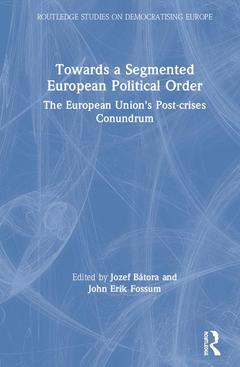Towards a Segmented European Political Order The European Union's Post-crises Conundrum Routledge Studies on Democratising Europe Series
Coordonnateurs : Bátora Jozef, Fossum John Erik

This book makes a distinctive contribution to the crucial debate on the European Union (EU)?s present and future development.
It systematically examines how the range of crises and challenges over the last decade have transformed the EU and relates those findings to the discussion of an increasingly differentiated EU. It argues that the post-crises EU shows clear signs of becoming a segmented political order with in-built biases and constraints. The book spells out the key features of such an order in ideational and structural terms and shows how it more concretely manifests itself in the EU?s institutional and constitutional make-up and in how member states constrain and condition EU action. Different states impose different types of constraints, as is underlined through paying explicit attention to the Visegrád countries.
This book will be of key interest to scholars and students of EU politics/studies, European integration and politics, East European politics and foreign policy.
1. Introduction
2. The Institutional Make-up of Europe’s Segmented Political Order
3. Illusions of Convergence: The Persistent Simplification of a Wicked Crisis
4. Epistemic Worries about Economic Expertise
5. What Kind of Crisis and How to Deal with it? The Segmented Border Logic in the European Migration Crisis
6. Toxic Neoliberalism on the EU’s Periphery: Slovakia, the Euro and the Migrant Crisis
7. European Solidarity in Times of Crisis: Towards Differentiated Integration
8. Interstitial Organisations and Segmented Integration in EU Governance
9. Undermining the Standards of Liberal Democracy within the European Union: The Polish Case and the Limits of Post-Enlargement Democratic Conditionality
10. Newspaper Portrayal of the EU in Crises in the Czech Republic, Slovakia and Hungary: The Union’s Imagined Linearity
11. European Crises and Foreign Policy Attitudes in Europe
12. Integration through Differentiation and Segmentation: The Case of one Member State from 1950 to Brexit (and Beyond)
13. Conclusion: A Segmented Political Order and Future Options
Jozef Bátora is Professor at the Department of Political Science, Faculty of Arts, Comenius University in Bratislava, Slovakia, and at the International Relations Department, Webster Vienna Private University, Austria.
John Erik Fossum is Professor at the ARENA Centre for European Studies, University of Oslo, Norway.
Date de parution : 11-2019
15.6x23.4 cm
Date de parution : 11-2019
15.6x23.4 cm
Disponible chez l'éditeur (délai d'approvisionnement : 14 jours).
Prix indicatif 56,04 €
Ajouter au panierThème de Towards a Segmented European Political Order :
Mots-clés :
EU Member States; Russia; Segmental Logic; Eastern neighborhood; Post-crisis EU; Brexit; Gdp Growth; migration crisis; European Migration Crisis; Visegrád group; Segmented Political System; European integration; Democratic Backsliding; Eurozone Crisis; EU Level Institution; Bátora; EU’s Crise Response; Fossum; Eurozone Member States; European Union; Differentiated Integration; EU Level Decision; German Marshall Fund; Constitutional Tribunal; Debt Gdp Ratio; EU Migration Policy; Gdp Threshold; EU Context; European Commission Expert Group; Egalitarian Solidarity; Epistemic Asymmetry; EU’s Democratic Credential; EEAS Headquarter; EU’s Treaty Framework



